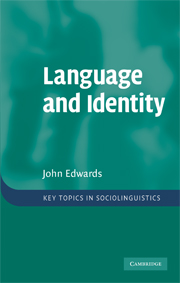Book contents
- Frontmatter
- Contents
- 1 Introduction
- 2 Identity, the individual and the group
- 3 Identifying ourselves
- 4 Language, dialect and identity
- 5 Dialect and identity: beyond standard and nonstandard
- 6 Language, religion and identity
- 7 Language, gender and identity
- 8 Ethnicity and nationalism
- 9 Assessments of nationalism
- 10 Language and nationalism
- 11 Language planning and language ecology
- Glossary
- Notes
- References
- Index
- References
9 - Assessments of nationalism
Published online by Cambridge University Press: 05 June 2012
- Frontmatter
- Contents
- 1 Introduction
- 2 Identity, the individual and the group
- 3 Identifying ourselves
- 4 Language, dialect and identity
- 5 Dialect and identity: beyond standard and nonstandard
- 6 Language, religion and identity
- 7 Language, gender and identity
- 8 Ethnicity and nationalism
- 9 Assessments of nationalism
- 10 Language and nationalism
- 11 Language planning and language ecology
- Glossary
- Notes
- References
- Index
- References
Summary
The argument that the term ‘nation-state’ is widely misused, that it has a focussed and specific meaning that should be retained, and that it ought not to be blithely employed as a synonym for ‘country’ or ‘state’, has been rejected in some quarters as narrowly pedantic, and in others as an illustration of a static mentality that fails to take into account changing sociopolitical circumstances. The first assertion need not trouble us greatly, especially given the sesquipedalian tendencies of those who prefer ‘nation-state’ to ‘country’. The second is more interesting, because it leads us towards a modern position that holds that there are two basic types of nationalism and that ‘nation-state’ can thus be a perfectly acceptable description, even of countries lacking any significant ethnic homogeneity. Implicit in this distinction, furthermore, is a sense that one type of nationalism is more advanced, more inclusive and less problematic than the other – which is why it is appropriate to discuss the matter under the general rubric of ‘assessment’. I turn here, then, to the concept of ‘civic nationalism’.
CIVIC NATIONALISM
Whereas ‘ethnic nationalism’ (or ‘ethnonationalism’) stresses the idea of a unity based upon ethnic attachments and a desire for the coincidence of national-group and political-group boundaries, ‘civic nationalism’ suggests another possibility. Anthony Smith (2007: 325) refers to a ‘cosmopolitan vision’, a perspective that some have come to see as superseding older and darker arrangements. Civic nations are, Smith notes:
based on the voluntary association of individual citizens who agree to live according to common values and laws which are essentially utilitarian and instrumental, and whose relationship to the state is direct and unmediated. […]
- Type
- Chapter
- Information
- Language and IdentityAn introduction, pp. 175 - 204Publisher: Cambridge University PressPrint publication year: 2009

